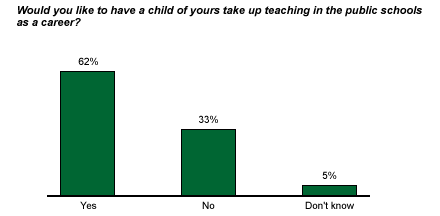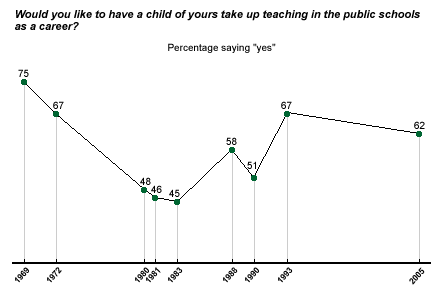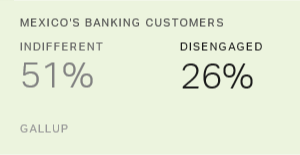Though they may dream about their children going on to become doctors, CEOs, or professional athletes, many parents would likely be happy just to see their children doing work that they love. Those who choose a demanding, typically low-paying career in teaching need that type of fulfillment -- but a little parental support doesn't hurt either. Luckily for the teaching profession, 6 in 10 Americans (62%) say they would like to see their children become public school teachers, according to the 2005 Phi Delta Kappa/Gallup Poll of the Public's Attitudes Toward the Public Schools*.

However, some parents might not like their child working so hard for so little pay. "I received no encouragement to go into education," says Leonard Bumbaca, a high school geometry teacher from Virginia. "My father would regularly remind me that for the 'same level of aggravation,' I could make a lot more money as an attorney." But for Bumbaca, parental encouragement wasn't necessary. After serving 10 years in the Navy, he was committed to sharing his knowledge and experience with students. "I like the intellectual development and maintenance, the relative autonomy the job provides and the immediacy of the work," he explains. "If I'm having a bad day, I can't just nurse my coffee and stare at my desk. I have to get past this and engage other people in a meaningful way."
Thirty-Five-Year Trend
The idea of a son or daughter becoming a teacher hasn't always been as well-received. In 1969, when the question was first asked in the PDK survey, a solid 75% of Americans said they would like their child to pursue a teaching career in the public schools. But that percentage declined to an all-time low of 45% in 1983. That was the year A Nation at Risk, the scathing report on public education in the United States, was released. Also, by the early 1980s, many new career opportunities had opened for women. In 1964, more than half of working female college graduates between the ages of 25 and 34 were teaching; by 2000, that figure had dropped to 15%.
By 1988, a majority of Americans again indicated they would like a child of theirs to become a public school teacher. After an increase to 67% in the 1993 Gallup/PDK poll, the percentage has declined to 62% today.

Todd McGovern, director of communications for Teach for America, which mobilizes high-performing college seniors from every field of learning to commit to teaching for two years, says he's not surprised that these days most Americans are enthusiastic. "In 2005, we hit a record high of 17,000 applications for 2,000 positions," he says. "Teach for America maintains a powerful recruiting presence on campus -- we are out there with Fortune 500 companies, media companies, etc., competing for top graduating seniors. In fact this year, 12% of the Yale and Spellman graduation class applied to become teachers, as did 8% of Harvard and Princeton, and 11% of the Dartmouth class."
Bottom Line
Teens aren't scratching teaching off their list of possible careers, either. A 2005 Gallup Youth Survey shows teaching is a top career choice for teens, on par with the medical and law professions (see "Teens' Top 10 Career Picks" in Related Items).
Nicole Honour, a Florida high school teacher and mother of two teenagers, says she chose teaching because she "wanted to be a source of support and inspiration for young people." She would encourage her own teens to follow in her footsteps, if either child expressed the desire. "I would say 'go for it,' but that it is very demanding -- however, it is also very rewarding."
*This article contains findings from the 37th Annual Phi Delta Kappa/Gallup Poll of the Public's Attitudes Toward the Public Schools, released on Aug. 23 in Washington, D.C.
The findings of the survey are based on telephone interviews with a random sample of 1,000 U.S. adults, aged 18 and older, conducted from June 9 to June 26, 2005. For results based on this sample, one can say with 95% confidence that the maximum error attributable to sampling and other random effects is ±3 percentage points.
